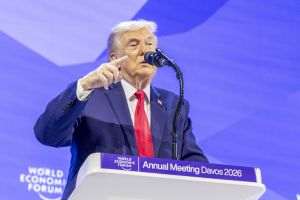The US economy is facing an "enormous amount of debt", so the challenge for the Federal Reserve is to keep interest rates high enough to benefit lenders, but not so high as to cause problems debtors, said the famous billionaire investor Ray Dalio, on CNBC.
His statement comes after the US central bank cut its benchmark interest rate by 0.5%, taking the federal funds rate to a range of 4.75-5%, the first cut since the Covid pandemic. The rate determines the cost of short-term borrowing for banks and impacts various lending products such as mortgages, car loans and even credit cards.
In Dalio's opinion, the Fed's maintenance of interest at a level that does not affect borrowers or creditors represents a difficult "balancing act", according to the mentioned source.
• The United States government has spent more than a trillion dollars this year on interest payments on its national debt, according to the US Treasury
The US Treasury recently reported that the government has spent more than a trillion dollars this year on interest payments on its $35.3 trillion national debt. This increase in debt costs coincided with a significant increase in the US budget deficit in August, which is approaching two trillion dollars for this year, CNBC also writes.
According to Dalio, debt, money and the business cycle are among the top five forces influencing the global economy. Dalio also emphasized that he is interested in the "enormous amount of debt created by governments and monetized by central banks, sizes that never existed in his lifetime", notes the mentioned publication.
It is a situation that arises in the conditions where governments around the world assumed record debts during the pandemic to finance measures to support economies that were ready to collapse.
• "As time goes on, it will go more and more towards the monetization of the debt, a similar path to that of Japan," said the billionaire
Dalio envisages a depreciation of the value of the debts, through a combination of artificially low real rates, which means no rewards for creditors.
In his view, the economy is "in relative balance," but there is an "enormous" amount of debt that needs to be rolled over, plus new government-created debt, according to CNBC.
In his view, neither Donald Trump nor Kamala Harris will make debt sustainability a priority, meaning debt pressure is unlikely to ease regardless of who wins the next presidential election.
"I think as time goes on, it's going to move more and more toward debt monetization, kind of like Japan," Dalio said, pointing to how the Asian country has kept interest rates artificially low, which has depreciated the yen. Japanese and reduced the value of Japanese bonds. "The value of a Japanese bond has fallen by 90%, so by artificially offering a reduced yield every year, the tax is extraordinary."
The Bank of Japan has maintained a negative rate regime for years, engaging in one of the world's most aggressive monetary easing exercises. It only recently increased interest rates, in March of this year.
Additionally, when the markets don't have enough buyers to take on the debt, there may be a need for interest rates to rise or for the Fed to step into the market and buy, which Dalio believes the U.S. Bank would do. "I would see the intervention of the Fed as a very significant negative event," said the billionaire, quoted by CNBC.









































